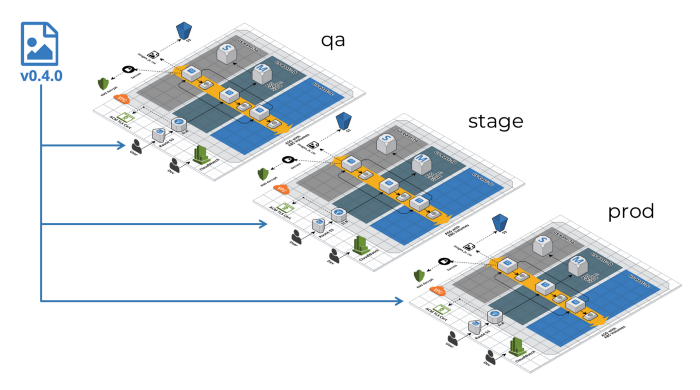Repository to test renovate dependency updates for terraform and terragrunt
Renovate is depdendabot on steroids.
This repo is not your typical terraform structure, it's best to keep modules in a separate repo to your config repo. See here for more info.
The purpose of the repo is to easily test custom config for various terraform and terragrunt renovate managers in one place.
The easiest way to use Renovate is to use the GitHub app, see here for the deployment options.
I opted to run it locally to give me more control over when it runs whilst I experiment:
npm i -g renovate
export RENOVATE_TOKEN=<my GitHub token>
LOG_LEVEL=debug renovate sajid-khan-js/renovate-testIt's also handy to run renovate-config-validator (comes with npm install of
renovate) before pushing changes to your config file (renovate.json).
Terragrunt deployment files.
Renovate will bump:
- Upstream module versions e.g.
github.com/cloudposse/terraform-null-label?ref=0.24.0 .terraform-versionand.terragrunt-versionfiles are used bytfenvandtgenvrespectively - Renovate will bump the version numbers in these files to the latest respective version
Terraform modules/stacks.
Renovate will bump:
- Provider and terraform version pins in specific cases
- Any upstream modules used in the stacks e.g.
github.com/cloudposse/terraform-null-label?ref=0.24.0
📝 Renovate is aware of the different terraform version constraints, meaning it doesn't simply bump versions but actually evaluates whether a bump is needed. Read more here and here
>= 2.0will not be bumped since this pin allows any newer version than2.0i.e. at runtime (when you runningterraform init), terraform will pull the latest provider version anyway~> 0.14.4will be bumped, but since the pessimistic operator is used (~>), renovate will bump to a version that satisfies this constraint e.g. if the latest version is1.0.4, bumping to1.0.0will still make the stack usable by anyone running terraform version1.0.X
It may seem counterintuitive to use flexible pins (e.g. ~> or even =>) for
modules in the context of testing. In theory, the same tests that run against
the same module may use a different provider:
Given the provider pin like so version = "~> 2.0"
- On Monday, tests against
dummy_stackare run, terraform downloads the latest version (2.1.1) of therandomprovider. - On Tuesday, a new version of the
randomprovider is released (2.2.0) - On Wednesday, tests are run again, against
dummy_stack, terraform downloads the latest version (2.2.0) of therandomprovider.
So, should you use a static pin e.g. version = "2.1.1" to ensure the same
provider is always used when testing?
In short, No.
There is a huge downside to using static pins. Modules that consume your module will be forced to use the exact same pin. This can be problematic if a module is consuming multiple modules all with different static pins. It's better to have some flexibility to save yourself from having to figure out complex dependency graphs and a convoluted rollout e.g. update module A, then B, then C, rather than simply update any module in any sequence. In addition, if you consume community based modules e.g. these GCP modules, you have no direct control over how they pin providers. HashiCorp themselves recommend the practice of flexible pins for providers
Although testing in general should limit variables, the purposes of testing terraform modules is to ensure you don't release a module that's broken. Does this infra code work with the respective Cloud API? In other words, does my terraform that is trying to create a storage bucket A) create the bucket B) configure the bucket as intended by the terraform config?
There is then a slim chance at runtime that your terraform module may not work
with a provider within your range since you may not have tested against it e.g.
~> 2.0 will allow 2.0.1, 2.1.0, 2.2.0 etc.
You should be running terraform plan before you run terraform apply, and
your terraform plan output should be visible and reviewed before terraform apply is run e.g. atlantis, GitHub
actions.
Doing so negates the slim chance a new patch (0.0.X) or minor (0.X.X)
version of the provider will break your infra.
Furthermore, module/stacks should be released (i.e. terraform apply) in lower
environment first:
Config file for renovate.
See here for configuration options
Check out the close/merged PRs to see what renovate can do
"Generally, the first reaction people have to automated dependency updates like Renovate is "oh great/feel the power of automation". The next reaction a few days or weeks later is often "this is getting overwhelming".Indeed, if you leave Renovate on its default settings of raising a PR every single time any dependency receives any update.. you will get a lot of PRs and related notifications"
The above quote is from here
Given this directory structure:
├── infra
│ ├── dev
│ │ └── deployment
│ │ └── terragrunt.hcl
│ └── prd
│ └── deployment
│ └── terragrunt.hcl
├── modules
│ ├── dummy_module
│ │ ├── README.md
│ │ ├── main.tf
│ │ ├── outputs.tf
│ │ ├── variables.tf
│ │ └── versions.tf
│ └── dummy_stack
│ ├── README.md
│ ├── main.tf
│ ├── outputs.tf
│ ├── terraform.tfstate
│ ├── variables.tf
│ └── versions.tf
We want to group dependency updates by env (e.g. one PR to update all of dev)
and by module/stack (e.g. one PR to update everything in dummy_stack).
You can achieve this in Renovate by using packageRules. You can group
directories with a static rule e.g.
"packageRules": [
{
"groupName": "dev",
"matchPaths": ["**/infra/dev/**"]
}
]or by using a dynamic rule e.g.
"packageRules": [
{
"groupName": "{{parentDir}}",
"additionalBranchPrefix": "{{parentDir}}-",
"matchPaths": ["**/modules/**"]
}
]Dynamic rules are useful for repos that have a high change rate e.g. a terraform modules repo where new modules are regularly created, this means you don't have to remember to create a rule every time you create a new terraform module.
